In September 1939, Lieutenant Mieczysław Przybylski commanded a company in the 1st Podhale Rifle Regiment. He fought bravely and when he was cut off with his men near Szymbark by the overwhelming German forces, he immediately went into partisan activities. Wounded in one of the skirmishes, in October he found himself in his brother's house in Rozenbark near Biecz.
Przybylski in Rozenbark has not ceased to be a Podhale inhabitant. When he recovered, he immediately made contact with a cell of the Union for Armed Struggle in Gorlice and began to recruit people to the unit - mainly non-commissioned officers and privates who avoided captivity or returned to their family homes. Over time, this unit became the 3rd battalion of the 1st Podhale Rifle Regiment of the Home Army, and "Michał", because that was the pseudonym of Lieutenant Przybylski, not only served as its commander, but became the commander of the Gorlice AK District.
Lieutenant Przybylski turned out to be a talented conspirator. And the terrain in which he was to operate was particularly difficult. Although the surrounding forests and ravines - called by the locals paris and hollows - favored the guerrillas, there were hardly any weapons for them. In September 1939, no major battles were fought here, so no weapons remained. "Michał" could only envy "Grim" and other commanders from the Świętokrzyskie Mountains - there was "Hubal" before, despite repressions, the peasants still kept a lot of rifles and grenades in their hiding places and waited only for the signal ... There were also airdrops - London took care of the Świętokrzyskie Mountains and sent planes with containers full of sten, brens, ammunition and grenades. For a long time, "Michał" could only dream about it. But he didn't wait with his arms folded…
Be invisible
The lieutenant's nephew, Andrzej Przybylski, was then in his teens and remembers how special his uncle and godfather were. “My uncle - recalls Andrzej Przybylski - was constantly on the move. None of his people had the right to come to our house, but he left it almost every evening. Neither we nor his wife, with whom he lived here, knew the purpose of these trips. We did not know if it was an armed operation or "only" a conspiratorial meeting. I remembered for a lifetime the advice he gave me:« The less people know about you, the better. As long as no one knows anything about me, as long as I am dangerous to the enemy. And no one will know about me ». It was very difficult, because you had to watch out not only for the Germans, but also for their Polish informers, who did not hesitate to spend a man to death for a larger or smaller payment. They did not manage to follow his uncle's footsteps, although they tried very hard.
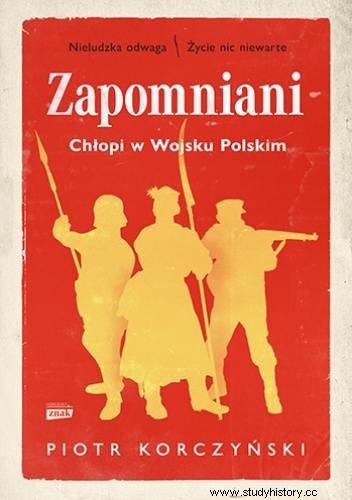
The text is based on the book by Piotr Korczyński "Forgotten. Peasants in the Polish Army ”, which has just been released by Znak Horyzont.
There was also a time when my uncle had to change his place of residence and moved away from us for a while. It was then that a deaf man who asked for food started to visit us. I don't know how, but my father found out he was mute . He told him outright one day:“You are the informer! You can speak ». From that moment on, he did not show up with us again. There were many people around our house, but the German soldiers stopped by it only once ... to pick pears from the roadside pear tree. My uncle was in his room at the time, but he had strong nerves and waited out the moment calmly. The commander of the largest partisan unit in the area and the entire AK district watched from the window as the Germans offered his brother's pears, unaware who was looking at them.
Worst enemy
The Rozenbark parish was not large - it had only four villages:apart from Rozenbark, these were Racławice, Bugaj and Sitnica. Everyone knew each other and almost everything about each other, and most were very poor, and the war only deepened the poverty in the countryside. It is not surprising then that there were those who were able to hand over the hiding Jews or conspirators to the Germans for a penny or even food. And so death took root in the parish.
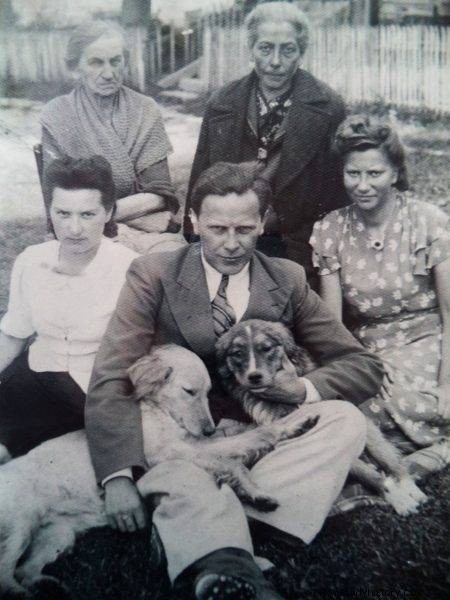
Lieutenant Mieczysław Przybylski "Michał" surrounded by his family, Rozembark 1944.
At one of the briefings, Lieutenant Przybylski said:"If the Germans burn good barns, we will burn the bad ones!" It started with an extremely mean Bahnschutz, who in Biecz was lashing his dog and shooting at people stealing coal from railway transports - he did not hesitate to shoot the children. A group of Home Army soldiers captured him in an ambush. He was locked in a basement at Józef Machowski's in the hamlet of Wyręby, from where he was taken to the forest and liquidated.
In May 1944, an execution group under the command of Antoni Kotlinowski carried out the death sentence on a particularly dangerous Gestapo confrontation from Binarowa. Unfortunately, during the execution of the sentence, two executors were recognized by the confidant's wife's sister . Already on the way back, Kotlinowski concluded that he had no choice - they had to come back and liquidate the murdered's sister-in-law and wife. He did so, for which "Michał" had a grudge against him. However, this effectively cooled down for some time all those who wanted to use the Germans in handing over Jews, conspirators, or even those who slaughtered pigs illegally or hid surplus grain. The captured Jews, their helpers (and their neighbors) were in danger of death and fire; for pig slaughtering or hiding a neighboring grain (chest) - a camp, transport to forced labor in Reich, at best - heavy beating by gendarmes.
A storm in Rozenbark
In the summer of 1944, an action was planned for the so-called Buciararnia - well-stocked military warehouses in Gorlice. The platoon of Jan Guzik from Rozembark was assigned to the attack. But nothing came of it, because the Germans, either biased or accidentally, strengthened their warehouse staff. Immediately after the cancellation of the action on Buciarnia, preparations for "The Tempest" began. In mid-August, in the forests stretching north from Rozembark, and adjacent to the forests in Ołpiny, there was a so-called training concentration of the Home Army and BCh units. The command of the grouping was taken by Lieutenant Franciszek Paszek "Kmicic", staying in the hamlet of Contin, surrounded on all sides by forests. This concentration is associated with one of the greatest tragedies that hit this area during the war.
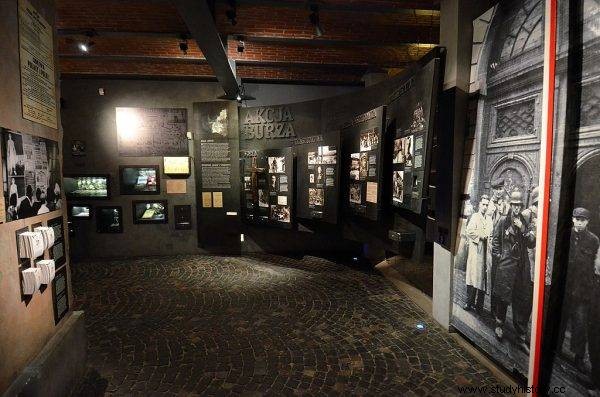
An exhibition devoted to the action "The Tempest" at the Warsaw Uprising Museum
One of the liaison officers of the Home Army from Rzepiennik Suchy was in Biecz in the morning on August 26, and he learned that the Germans from the local police station were about to start collecting the contingent from Rzepienniki to Gromnik. He saw two horse-drawn carriages and seven soldiers getting ready to leave. He pedaled quickly on the road to Rozembark and alerted one of the troops quartering in nearby houses after the concentration. He found soldiers from the Home Army battalion "Barbara" in the Tarnów region. Partisans quickly prepared an ambush in the bushes on the part of the road that was far from the houses and separated three villages - Rozembark, Sitnica and Rzepiennik Suchy . They put a young soldier on the watch - Fryderyk Jaworski "Wierusz" from Tuchów.
When the Germans arrived, they noticed a man with a rifle leaning out of the bushes and immediately opened fire on him. Jaworski died on the spot, but it was too late for German soldiers. They were mowed from the Erkaems placed in the bushes; five died at once, the sixth - seriously wounded - rolled down the hill and died by the stream flowing in the hamlet of Sitnica - Ukraine; the seventh soldier survived, threw himself into the nearby potato fields and saw what happened to the corpses of his comrades before escaping to his own.
The AKs seized the frightened horses, collected their weapons, took the uniforms and shoes from the corpses and set off with the captured carts. After them, peasants came from nearby houses and stripped the corpses of what was left naked. The German, who was lying badly wounded by the stream, was found by Anna Guzik, an inhabitant of the house closest to the road where the skirmish took place. She ran to the center of Sitnica and notified the village leader, who ordered her to return and bring the wounded with her harness to her home . The woman did not have a horse on the farm, so she harnessed a cow to the cart, and before she reached the village administrator's house, the German died. At that time, the surviving soldier reached Ołpin through the fields, where he told about everything at the local police station.
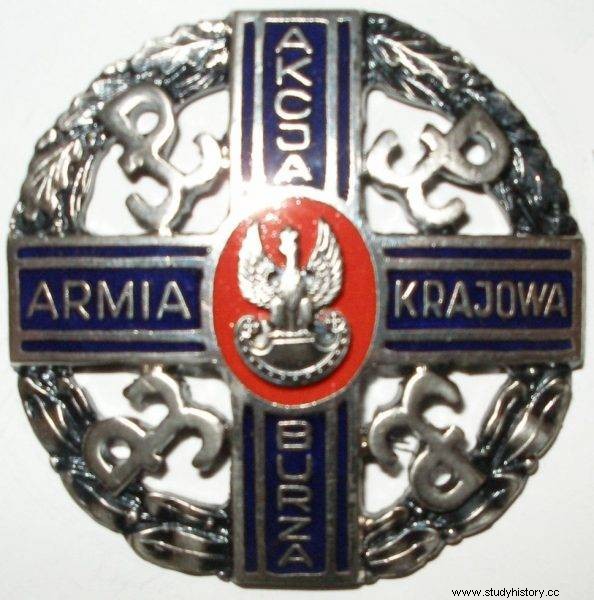
Home Army badge awarded for participation in the action "Burza"
Three days later, on August 29, motorcycles and trucks from the German gendarmerie arrived at Rzepiennik Suchy. They immediately set fire to the thatched roofs of cottages that belonged to peasants who stripped the bodies of German soldiers from their underwear. They also burned down Anna Guzik's house, and they wanted to arrest her herself, but she managed to escape. They commandeered all the pigs and cattle from all over the village. And finally they dragged nineteen hostages tied with barbed wire from the truck and shot them at the scene of the ambush . They were prisoners arrested by the Gestapo and held in the Jasło prison. After the execution, risking his life, they were photographed by Władysław Czyżyk, one of Michał's subordinates. These photos were used after the war to identify the murdered.
Watch for information
It is so unfortunate that "The Tempest" began in the Rozembarska parish. In September, Lieutenant Przybylski finally got a report about the planned Allied weapons drop for his 3rd battalion. At the end of September, he and his staff stood on Bugaj - the third village belonging to the Rozenbark parish. He stayed in a manor belonging to the Congregation of the Missionary Fathers à Paulo in Krakow, right next to the dense forests on the border with Moszczenica. The drop date is set for September 29th.
There seemed to be nothing in this secluded area to prevent the capture of the weapon cache, but then the informant appeared again. One of the residents of Bugaj went to nearby Kwiatonowice, where a German NCO school was located in the manor . On the spot, he informed about the partisan group of its commander. The informer requested the watch from the German officer, which he had received. Alarmed by the school elewi immediately moved towards Bugaj, calling for reinforcements at the same time.
Partisans of Capt. "Michael", due to poor weapons and small ammunition stocks, had no better chance to maintain their positions and designated drops. After dark, the captain ordered to break away from the enemy and withdraw. Of course, in the face of the situation, there was also no dropping of the weapon. And yet the partisans could speak of luck, as none of them died in this clash. During the battle, only the buildings of one of the farms near the forest burned down. The confessor did not enjoy the German watch for a long time, he was captured by the Home Army and shot.
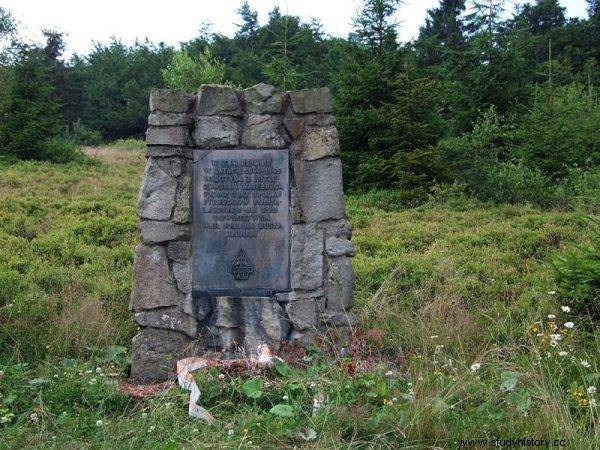
Monument commemorating the soldiers of the 9th Company of the 3rd Battalion of the 1st PPS AK at Hala Łabowska
When in January 1945 the Soviets entered Rozenbark and the surrounding villages, and at the same time the news came about the dissolution of the Home Army by its commander in chief, General Leopold Okulicki, already in the rank of captain, "Michał" decided to reveal himself with his battalion. He did not want to expose people to the repressions of the red colossus. Alone with his wife and a few of his people, he left for Silesia, where he settled in Zabrze. He did not start visiting his brother in Rozenbark, who was baptized as Rożnowice, until 1956.
Source:The text is an excerpt from Piotr Korczyński's book “Forgotten. Peasants in the Polish Army ”, which has just been released by Znak Horyzont.

